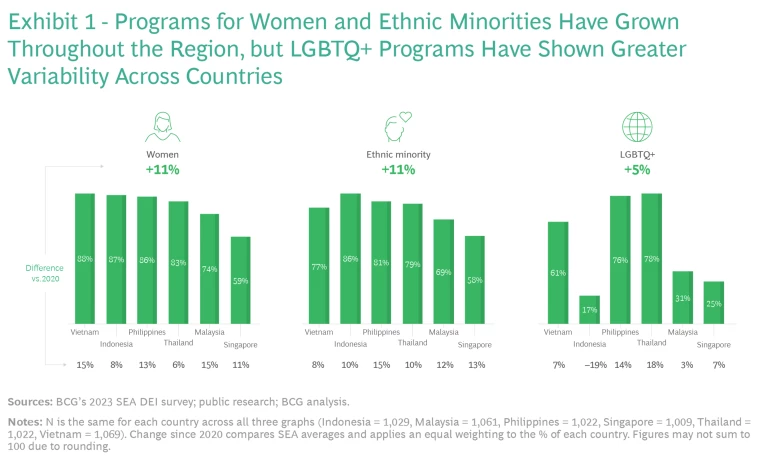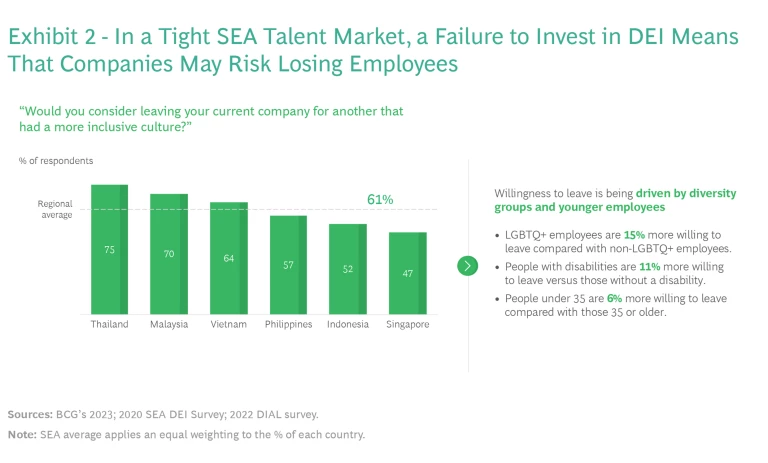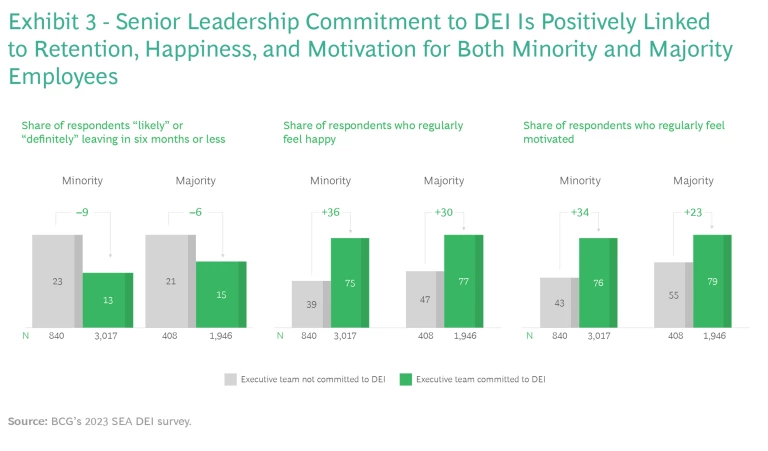Over the past three years, companies in Southeast Asia have made sizable progress on their DEI initiatives. That progress is worth celebrating, yet business leaders in the region say that there is far more work to be done. Specifically, they feel that DEI is valuable in building a more innovative culture, enhancing the employee value proposition, and improving business performance. But they can capture these benefits only by redoubling their efforts to create a more diverse, equitable, and inclusive workplace.
BCG’s 2023 survey asked more than 6,000 employees in six Southeast Asian countries (Indonesia, Malaysia, Philippines, Singapore, Thailand, and Vietnam) about their company’s DEI programs and their overall experience. The survey looked at three underrepresented groups: women, LGBTQ+ employees, and ethnic minorities. In addition, we asked follow-up questions about other factors such as immigration status, socioeconomic status, caregiver status, and ability to work remotely. (This research follows a similar survey we conducted in 2020 that used the same methodology.) We then expanded and enriched our results with a roundtable discussion of senior business leaders at some of the most successful and best-known companies in Southeast Asia. On a positive note, the results show that companies have made good headway. But some employees—specifically those who identify as LGBTQ+—are seeing smaller gains.
The challenge now is how to improve and how to determine which DEI programs provide the best returns. Our analysis points to clear measures companies can take to improve their DEI performance. Critically, these measures must be linked to the unique needs of each country, company, and employee group. By applying an individualized and differentiated approach, Southeast Asian organizations can create more diverse, equitable, and inclusive workplaces and transform DEI into a source of competitive advantage.
Meeting the Demands of a Diverse Population
DEI is crucial for organizations to thrive in all markets, but it’s particularly important in Southeast Asia—a highly heterogenous region of 680 million people who comprise more than 1,500 ethnic groups and speak more than 1,000 languages and dialects. Roughly two-thirds of the population is of working age, and many have intersectional identities; that is, they represent more than one aspect of diversity. For example, an employee may identify as a woman, LGBTQ+, an ethnic minority, and a person with a disability.
43% of respondents overall said their companies had diversity programs, up from 36% in 2020. However, these advances can be highly variable.
Overall, our survey results show that the region has made broad progress in adopting DEI programs over the past three years, despite the challenges posed by COVID. When asked whether their company has diversity programs in place across the three main dimensions that we considered—women, LGBTQ+, and ethnicity—43% of respondents overall said yes, up from 36% in 2020. However, these advances are highly variable. Looking at the data by DEI characteristics reveals where countries have made the biggest gains and where more effort is required. (See Exhibit 1.)

Women. Throughout the six countries we researched, the share of employees saying that their company has DEI programs in place to support women increased between 6 and 15 percentage points. Moreover, programs for women are seen as highly effective, especially in Indonesia and Vietnam, where roughly 90% of women respondents say they have personally benefited from them. Yet those benefits don’t yet translate to true equality: 72% of women say that they still face obstacles at work because of their gender, citing issues with leadership commitment, recruitment, retention, advancement, and pay.
Ethnicity. Similarly, programs aimed at ethnic minorities have become more prevalent. The number of respondents who say that their company has such a program in place increased by 8 to 15 percentage points over the past three years. It’s worth noting that the gains were widespread; all six countries in our analysis showed progress. Yet 62% of ethnic minorities say that they, too, face significant obstacles at work.
LGBTQ+. The DEI population that showed the most variable results over the past three years is LGBTQ+ employees. Overall, respondents in the region are on average 5 percentage points more likely than in 2020 to say that their company has a program for LGBTQ+ employees. But in Indonesia, Singapore, and Malaysia, fewer than one-third of respondents say that their company has an LGBTQ+ policy.
In addition, employees say that LGBTQ+ policies are less effective than those for women or ethnic minorities (with Malaysia and Thailand as exceptions). More than two-thirds of LGBTQ+ employees say that they experience obstacles because of their identity—and cis-straight employees are less likely to recognize these obstacles than majority groups do for other aspects of diversity (a gap of 12 percentage points). This points to a perception gap between leaders, who are typically cis-straight and in charge of creating an inclusive culture, and their LGBTQ+ employees, who are the ultimate beneficiaries. In establishing or reexamining the policies, leaders should make sure they are aware of the needs of their LGBTQ+ (and other diversity groups) workers and wherever possible include representatives of these groups when designing their offerings.
LGBTQ+ employees also say that they face unique challenges in their day-to-day work life. For example, 64% feel they are expected to play the role of listener and peacekeeper in meetings, compared with only 51% of non-LGBTQ+ employees. Furthermore, LGBTQ+ respondents were roughly 10 points more likely to report being tasked with nonwork errands such as buying gifts and picking up lunch or coffee.
The Business Case for DEI
In both the research results and the subsequent roundtable discussion, business leaders in SEA strongly agreed that investing in a DEI agenda is a crucial element in creating business value. Among survey respondents, 89% of people in leadership roles believed that integrating a DEI lens into their company’s strategy can generate new business opportunities. That aligns with a growing body of BCG research quantifying the gains from a comprehensive approach to DEI. For example, BCG’s recent BLISS (bias-free, leadership, inclusion, safety, and support) research found that senior leadership commitments to DEI have dramatic effects in attracting and retaining highly valued employees.
Most employees want a more diverse, equitable, and inclusive workplace—and many will change jobs to find one.
One clear advantage of having a diverse workforce is that companies can better understand the perspective of a wider range of customers and therefore serve them better. They can tap into new markets, expand their customer base, and improve business resilience. (See the sidebar “Standard Chartered Bank Launches a Financing Facility for Women Entrepreneurs.”)
Standard Chartered Bank Launches a Financing Facility for Women Entrepreneurs
Through this offering, SCB has more effectively targeted small and medium-sized enterprises and built a strong link to the Malaysia’s growing segment of women entrepreneurs. The product has seen strong uptake and was particularly valuable to women clients during the pandemic, when cash-flow support was critical.
Retaining talent is another rationale for investing in DEI. Most employees—even those from majority groups—want a workplace that is more diverse, equitable, and inclusive, and the survey results show that people will change jobs to find one. More than half of all respondents say that they are willing to leave their current employer for a more inclusive culture. As Exhibit 2 shows, the highest share of these employees was in Thailand (75%), followed by Malaysia (70%) and Vietnam (64%).

The willingness to leave is notably higher among LGBTQ+ employees, those with a disability, and those younger than 35. In a very tight talent market across Southeast Asia, where unemployment is 2% to 3% in many countries, this further underscores the urgency of prioritizing DEI to retain employees and reduce turnover costs.
DEI Solutions That Work
Given the importance of DEI to employees and the business alike, the question is how companies can make faster progress. Our analysis, along with our experience helping clients in the region improve their DEI performance, points to several sets of measures.
Ensure commitment among senior leaders. Creating a diverse, equitable, and inclusive environment begins at the top. The BCG study mentioned above, which identifies the factors that influence experiences of inclusion in the workplace, found that the commitment of senior leaders and direct managers is a critical factor in creating an environment in which people can thrive.
A greater emphasis on hard metrics to track promotions and other career decisions across diversity groups can help to achieve a more bias-free workplace.
Our research in Southeast Asia reinforces these findings. When respondents believed that the executive team was committed to DEI, the turnover risk decreased by 9% for women, ethnic minorities, and LGBTQ+ employees. Importantly, an inclusive environment raises the boat for everyone; in an inclusive workplace, the intent to quit among ethnic majorities decreased by 6%. All employees also reported a significant increase in happiness and motivation, ranging from 20 to 30 percentage points. (See Exhibit 3.)

Establish a baseline of foundational measures that benefit all groups. As a first step in building a DEI culture, all organizations should invest in foundational measures that employees throughout Southeast Asia deem most effective. There are some national differences but in general, the rankings of table-stakes measures were consistent across the countries we studied:
- BCG’s BLISS research found that antidiscrimination measures play a key role in supporting an inclusive work environment, resulting in increased employee happiness, motivation, ambition, and retention. Policies that set clear expectations for employees to treat each other with respect are essential to employee well-being. Although these policies are already in place at most large SEA organizations, the main challenge is awareness and follow-through to ensure that employees understand the expectations and see leaders serving as role models. Among survey respondents, only about 50% were aware of antidiscrimination policies at their company. This reveals a significant communication and execution opportunity for companies.
- Offering interventions to employees during pivotal junctures in their lives, particularly events that are related to their identity, are also critically important. For example, companies can establish market-leading parental leave policies and offer support to employees returning to work after childbirth, to LGBTQ+ employees after they come out, or to caregivers when aging parents require more support. Onboarding new employees is another important juncture. BCG research has found that most LGBTQ+ employees come out within their first 12 months in a new job or not at all. Importantly, that study also identified specific actions that companies can take to help employees feel comfortable in sharing their identity—thus boosting teamwork and retention.
- Bias-free performance evaluations and promotions reduce managers’ tendency to favor employees who share a similar background. A greater emphasis on data—hard metrics to rigorously track promotions and other career decisions across all diversity groups—can help to achieve this goal. In addition, the use of natural language programming to analyze the language used in upward and downward feedback can reveal biases.
Our research also highlighted two areas that have become more important since we did the 2020 research:
- Having a bias-free day-to-day work experience has risen to the top among issues of importance to employees. Leaders must address the microaggressions that underrepresented groups often face in the workplace, in particular when leaders staff teams, choose who attends specific meetings, or consider candidates for high-profile assignments and projects. Small, everyday actions such as interrupting people in meetings, dismissing their views, or verbally harassing them add up to an unwelcoming and non-inclusive work environment. Companies can mitigate these behaviors through anti-bias training, communicating in more welcoming ways to all groups, and establishing mechanisms such as a confidential ombuds process or anonymous call line for employees to report bias or persistently unfair working conditions.
- Setting aspirations and measuring progress is crucial to improving a company’s DEI performance. Goals and metrics should track all aspects of the employee life cycle: recruiting, retention, advancement, representation at every level of seniority, living wage, and pay equity. Moreover, transparency about DEI performance—linked to compensation and promotion for leaders—increases accountability and sends a clear signal of the organization’s commitment. (See the sidebar “Singtel Makes Its DEI Performance Public.”)
Singtel Makes Its DEI Performance Public
Each year, Singtel surveys employees about their feelings of inclusion, belonging, and ability to be their authentic selves at work. The data is analyzed across gender, age, and tenure to identify potential gaps. Importantly, as part of its annual sustainability report, Singtel publishes its DEI strategy, key results from the employee survey, and metrics such as representation, retention, recruiting, and access to training. This information is tracked over multiple years, helping the company hold leaders accountable for generating results.
Singtel’s efforts have led to positive employee engagement and strong representation of women. The company reports that its Singapore workforce now comprises 45% women, up from 35% in 2022. The company’s commitment to gender equality has earned Singtel a place on the Bloomberg Gender Equality Index five years in a row. In the firm’s latest survey, 88% of employees say that the work atmosphere is open and welcoming to people from various backgrounds. Singtel takes a step beyond inclusion to ensure that employees feel accepted and valued as part of the Singtel community and connected to the organization’s purpose and culture.
Implement targeted measures for specific groups. In addition to foundational interventions, our research also identified a set of DEI measures that women, ethnic minorities, and LGBTQ+ employees value but may be overlooked because they aren’t perceived as important by company leaders, who tend to be cis-straight, men, and in the ethnic majority. These are gaps that leadership teams need to address:
- Women highlighted structural workplace interventions such as nursing rooms and sufficient bathrooms as important. In addition, they value visible role models in leadership far more than men do.
- Ethnic minorities identified two priority interventions. The first is anonymous screening of job applicants, in which potential hires do not include a photo or state their ethnicity during the application process; and when names can reveal a person’s ethnicity, they should be removed from applications. Anonymous screening helps avoid unconscious bias among hiring managers and ensure that companies assess candidates based on their qualifications. The second intervention is formal individual sponsorships. Established advancement and professional development processes may have inherent biases and overlook ethnic minority employees. Assigning a senior business leader and/or HR counterpart to help guide these employees can mitigate such risks and ensure that people have a fair shot at competing for more senior roles and career pathways.
- For LGBTQ+ employees, the priority intervention is a leadership team or committee tasked explicitly to create and oversee the company’s DEI agenda. They typically include senior leaders—people at the C-level, along with the heads of business units—and employees from across the organization to ensure that all perspectives are included. These entities are accountable for the DEI strategy’s success.
Tailor your approach. Last, companies must understand that employees are not homogenous groups. When designing DEI programs and benefits, it’s crucial that they take a disaggregated view and understand the needs and wants of their own specific markets and employee groups. In our findings, differences emerged across the top issues by group and country. For example, in Singapore, women and ethnic minorities highlighted recruitment as the biggest challenge, while advancement and retention were seen as the biggest challenges by women and LGBTQ+ respondents in Indonesia, Philippines, and Thailand.
Similarly, the importance of different interventions varied across countries:
- In Indonesia, recruiting interventions (such as hiring candidates from nontraditional recruiting pools) and public commitments from CEOs were valued more highly than the overall average for the region.
- In Singapore, parental benefits such as family leave and on-site childcare, along with accessible and anonymous reporting mechanisms for DEI-related issues, were more important to employees.
- Among Thai employees, formal sponsorship, individualized advancement paths, and balanced candidate pools were most important.
Company-level differences add another level of complexity. Accordingly, leadership teams need to listen to their workforce and apply a tailored approach that links solutions to their unique context. That means broadening the scope of DEI investments beyond diversity groups to ensure that all employees are included. (See the sidebar “Ayala Expands Its DEI Lens to Include Nontraditional Aspects of Diversity.”)
Ayala Expands Its DEI Lens to Include Nontraditional Aspects of Identity
Ayala’s leadership team realized that the company needed to consider aspects of employees’ identity beyond traditional demographic metrics such as gender and ethnicity. These include where employees studied, which part of the country they grew up in, and their socioeconomic status.
The company expanded the scope of its HR analytics to capture these dimensions of diversity. It also created a “mirror board”—a committee of young, high-performing talent from different backgrounds—to ensure that perspectives were collected from across the organization. Based on those insights, Ayala revamped its benefits packages, which in the past had allowed only legally recognized dependents to qualify. Under the new approach, employees could share benefits with any family member they chose, regardless of whether they had a legal tie to the employee. The expanded medical eligibility allowed 10% of Ayala’s employees to enroll dependents who were not eligible before, which resulted in a 6% increase of the total number of enrolled dependents. These were primarily employees’ partners of any gender and parents (up to 75 years old) of Ayala’s single employees. Employees appreciated these enhancements as a sign of the company’s progressive and inclusive values. Ayala also found that younger employees tend to gravitate toward companies that implement policies that are focused on purpose, diversity, and inclusion and these initiatives resonated particularly well with them.
In addition, Ayala conducted a pay equity audit and expanded its analysis beyond gender to include other factors that may have reflected bias. For example, the results showed that employees with shorter tenures were often getting paid less than longer-tenured colleagues with equivalent responsibilities. The company now undergoes a regular pay-audit cycle with this expanded view of DEI.
The DEI progress among Southeast Asian companies over the past three years is worth celebrating, yet SEA business leaders say that it is still not enough. Employees and other stakeholders are increasingly aware of companies’ social impact, and there are real risks in failing to embrace DEI, including poor morale, turnover, and declining business performance. Our findings show that there are significant returns for companies willing to do the work required to build truly equitable workplaces. Importantly, Southeast Asian business leaders are increasingly recognizing the value of DEI and are focusing their efforts and investments accordingly.
The authors would like to thank Ryley Mehta, Ashutosh Sinha, and Eleanor Furtado for their contribution to this report.








